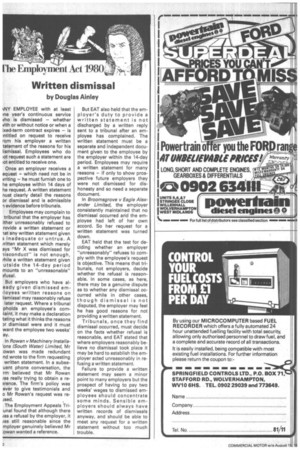Written dismissal
Page 36

If you've noticed an error in this article please click here to report it so we can fix it.
by Douglas Ainley NY EMPLOYEE with at least ine year's continuous service vho is dismissed — whether with or without notice or when a ixed-term contract expires — is ntitled on request to receive rom his employer a written tatement of the reasons for his lismissal. Employees who do lot request such a statement are lot entitled to receive one.
Once an employer receives a equest — which need not be in writing — he must furnish one to he employee within 14 days of he request. A written statement nust clearly detail the reasons or dismissal and is admissible evidence before tribunals.
Employees may complain to tribunal that the employer has ither unreasonably refused to rovide a written statement or -tat any written statement given 3 inadequate or untrue. A tritten statement which merely ays "Mr X was dismissed for lisconduct" is not enough, rhile a written statement given utside the 1 4-day period mounts to an "unreasonable" afusal.
But employers who have aleady given dismissed emiloyees written reasons on ismissal may reasonably refuse later request. Where a tribunal pholds an employee's cornlaint, it may make a declaration tating what it thinks the reasons )r dismissal were and it must ward the employee two weeks' ay.
In Rowan v Machinery lnstalla'ons (South Water) Limited, Mr owan was made redundant nd wrote to the firm requesting written statement. In a subseuent phone conversation, the rm believed that Mr Rowan ras really trying to obtain a re3rence. The firm's policy was ever to give testimonials and o Mr Rowan's request was reased.
The Employment Appeals Triunal found that although there as a refusal by the employer, it ras still reasonable since the mployer genuinely believed Mr owan wanted a reference. But EAT also held that the empl oye r's duty to provide a written statement is not discharged by a written reply sent to a tribunal after an employee has complained. The written statement must be a separate and independent document given to the employee by the employer within the 14-day period. Employees may require a written statement for many reasons — if only to show prospective future employers they were not dismissed for dishonesty and so need a separate document.
In Broomsgrove v Eagle Alexander Limited, the employer consistently maintained that no dismissal occurred and the employee had left of her own accord. So her request for a written statement was turned down.
EAT held that the test for deciding whether an employer "unreasonably" refuses to comply with the employee's request is objective. This means that tribunals, not employers, decide whether the refusal is reasonable. In some cases, as here, there may be a genuine dispute as to whether any dismissal occurred while in other cases, though dismissal is not disputed, the employer may feel he has good reasons for not providing a written statement.
Tribunals, once they find dismissal occurred, must decide on the facts whether refusal is reasonable, and EAT stated that where employers reasonably believe no dismissal took place it may be hard to establish the employer acted unreasonably in refusing a written statement.
Failure to provide a written statement may seem a minor point to many employers but the prospect of having to pay two weeks' wages to dismissed employees should concentrate some minds. Sensible employers should always have written records of dismissals anyway, and should be able to meet any request for a written statement without too much trouble.




































